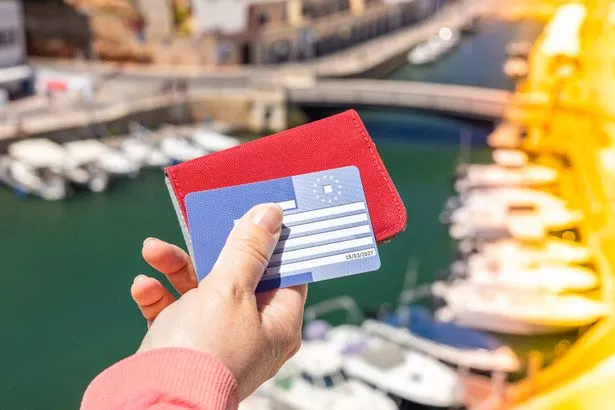The card provides free or reduced-cost medical treatment while travelling overseas and could save you a lot of money Having this card could save you hundreds of pounds if you need medical treatment in Europe(Image: Getty)
Having this card could save you hundreds of pounds if you need medical treatment in Europe(Image: Getty)
Brits planning a holiday in Europe this summer are being advised to secure a free card that could save them a large sum in potential medical costs. The valuable card allows holders to benefit from free or reduced-cost healthcare while abroad.
The UK Global Health Insurance Card (GHIC), which took over from the old European Health Insurance Card (EHIC), is an essential piece of kit for travellers. Although it’s still wise to have comprehensive travel insurance, the GHIC provides access to public healthcare services across much of Europe at a reduced cost or even for free.
The NHS website states: “The UK Global Health Insurance Card (GHIC) lets you get necessary state healthcare in the European Economic Area (EEA), and some other countries, on the same basis as a resident of that country. This may be free or it may require a payment equivalent to that which a local resident would pay.”
For those who already have an EHIC, it remains valid until its expiry date. Once expired, a new GHIC will need to be obtained. Remember that receiving your GHIC by post can take up to 15 days, so it’s advisable to apply well before your intended travel date.
How to apply for a GHIC
As reported by the Liverpool Echo, all UK residents are eligible for a UK GHIC, and you can include family members within one application. When applying, you’ll be required to provide:
- Your full name
- Residential address
- Date of birth
- National Insurance number
- Health and Care number (applicable to Northern Ireland residents)
Each person needs their own individual card. And you can include your partner and children when submitting your application.
Expect to receive confirmation from the NHS within 24 hours of submitting your application, either approving or declining it (and don’t forget to check your spam folder). Further details or documents might be required before final approval.
However, should you find yourself abroad without your card and need emergency medical treatment, you can apply for a Provisional Replacement Certificate (PRC) for interim cover.
 The GHIC card replaced the EHIC card(Image: Getty)Where to use your card
The GHIC card replaced the EHIC card(Image: Getty)Where to use your card
Your card enables you to access essential state-provided healthcare while travelling, which cannot be delayed until you return to the UK – commonly referred to as “medically necessary healthcare”. This includes:
- Emergency situations and A&E treatment
- Ongoing treatment or routine care for chronic or existing medical conditions
- Standard maternity services, assuming you’re not travelling specifically to give birth
It’s vital to arrange specific treatments such as kidney dialysis or chemotherapy with healthcare providers in your destination country, as local services may not always be prepared to cater to these requirements. The decision on whether treatment is medically necessary is determined by the healthcare provider in the country you’re visiting.
State-provided healthcare isn’t always complimentary outside of the UK. You might have to pay for treatments that are free on the NHS if a local resident would be expected to pay in the country you’re visiting.
Before travelling, it’s advised to research the state-provided healthcare services in the country you’re visiting and any potential charges you might incur. You can find information on how to access treatment in the country you’re visiting by checking the relevant country guide on GOV.UK.
However, a GHIC (or EHIC) card does not replace travel and medical insurance or cover services like:
- Medical repatriation (being flown back to the UK)
- Treatment in a private medical facility
- Ski or mountain rescue
Therefore, the NHS recommends securing private travel and medical insurance for the duration of your trip. A UK GHIC can be used when visiting:
- A nation within the European Economic Area (EEA)
- Montenegro
- Australia
- Jersey, Guernsey and the Isle of Man
- St Helena, Tristan and Ascension
If you belong to one of the following categories, you can use a UK GHIC:
- A British national
- A Swiss national
- An EU citizen
- A refugee
- A stateless person
- A family member of someone who holds one of the above nationalities or statuses
The UK government is presently in discussions with numerous countries to broaden the reach of the UK GHIC. Therefore it’s always wise to verify coverage prior to setting off on your travels. For further details, visit the NHS website here.
